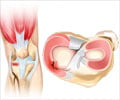
‘In the setting of concomitant ACL reconstruction, intraoperative PRP does not decrease meniscus repair failure risk.’
Tweet it Now
The meniscus is a piece of cartilage that acts as a shock absorber between the shinbone and thighbone.Researchers at The Ohio State University in Columbus sought to determine whether intraoperative PRP affects meniscus repair failure risk and whether the effect of PRP on meniscus failure risk is influenced by ACL reconstruction status or by PRP preparation.
The researchers randomized 550 patients into two main groups: patients who underwent meniscus repair surgery with PRP and those who did not receive PRP therapy. Patients with concurrent ACL reconstruction were assessed for meniscus repair failure within three years.
Patients who did not receive PRP therapy experienced a meniscus failure rate of 17 percent while those who were given PRP had a 14.7 percent failure rate. The effect of PRP on meniscus failure risk was dependent on ACL injury status--those who had only a meniscus PRP was associated with a lower risk of failure but those with ACL surgery, PRP was not associated with a lower risk of failure.
"PRP preparations utilized in the current study had a substantial protective effect on isolated meniscus repair failure risk over three years," said Dr. Joshua Scott Everhart.
Advertisement
Source-Eurekalert









